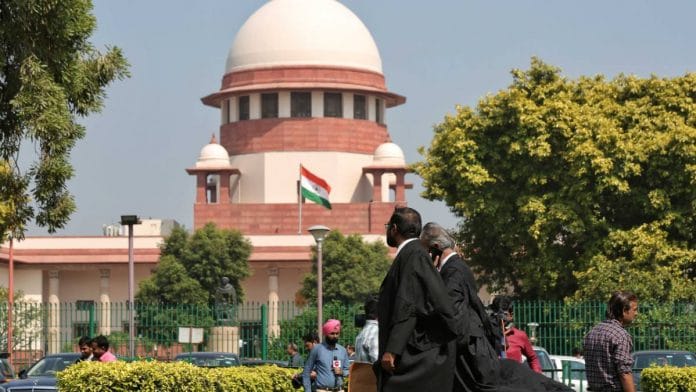New Delhi: Outlining a procedure that could be adopted to recruit retired judges for ad-hoc appointments to high courts, the Ministry of Law and Justice has proposed itself as the agency that will seek the President’s prior consent before the high court chief justices finalise the names for the re-appointments.
Under the suggested guidelines, each chief justice will prepare a panel of judges and former judges who have retired within a year and, after taking their consent, will formulate a proposal for their engagement and give full justification for it before sending this on to the Union law minister.
At this stage, the proposal will contain only the number of retired judges proposed to be appointed, and only after the President gives “in-principle” consent will the chief justices recommend specific names.
The procedure was drawn out in a letter that was sent to the Supreme Court in August 2021 by Union law minister Kiren Rijiju, asking the court to supplement the existing Memorandum of Procedure (MoP) to formalise the appointment of ad-hoc judges.
The MoP — which guides appointments in the higher judiciary — contains a reference to ad-hoc judges in high courts, but is silent on other aspects such as the criteria for hiring and disengagement of services.
The communiqué was sent four months after the top court directed the government to make ad-hoc appointments to high courts under Article 224A of the Constitution, which says such a judge can be recruited only with the “previous consent” of the President.
As reported by ThePrint last week, while the Supreme Court is yet to respond to the letter, it has taken up the matter on the judicial side.
Last week, Rijiju’s August 2021 letter was placed before the Supreme Court bench hearing the case as part of the central government’s status report.
This was done in response to the court’s order seeking to know what steps had been taken to follow up the April 2021 judgmentt that had laid down triggering points to hire ad-hoc judges, one of them being 20 per cent vacancy in a high court.
During the hearing, a bench led by Justice Sanjay Kishan Kaul suggested a less cumbersome process to appoint ad-hoc judges. Although he did not comment on the proposed guidelines, the court left it to the collegium to decide on the administrative side.
Also read: Supreme Court suggests using ad-hoc judges to fill high court vacancies, tackle pending cases
The proposed guidelines
Accessed by ThePrint, Rijiju’s 2021 letter was written to then Chief Justice of India N.V. Ramana, asking him to convey the Supreme Court Collegium’s unanimous views about the Union government’s suggestion to amend and supplement the MoP.
Apart from prescribing the procedure to seek the President’s prior consent, the government is also of the view that the number of retired judges appointed ought not to be more than five in a high court and not exceed 20 per cent of the sanctioned strength of regular judges. Their tenure would not exceed two years and a retired judge who is re-appointed would not perform any other legal work, even as an arbitrator.
While recommending a former judge’s name for an ad-hoc appointment, the chief justice of the high court concerned must furnish the statistics of the candidate’s previous judicial performance for at least three years prior to retirement, along with “his views on the quality and quantum of disposal of his or her cases”. Complaints, if any, against the former judge should also be shared with the ministry.
In case the chief justice chooses to nominate a serving judge to be appointed to an ad-hoc post in future, after his or her retirement, a similar docket should be prepared with regard to this candidate as well, the minister’s letter states.
If there’s a gap between retirement and re-appointment, there should be a background check on the candidate to verify his or her “integrity, and in addition to that, a medical examination should be conducted to ensure the person’s physical fitness”, the guidelines say.
(Edited by Nida Fatima Siddiqui)
Also read: In report to SC, Modi government ‘blames’ high courts for delay in judges’ appointments






